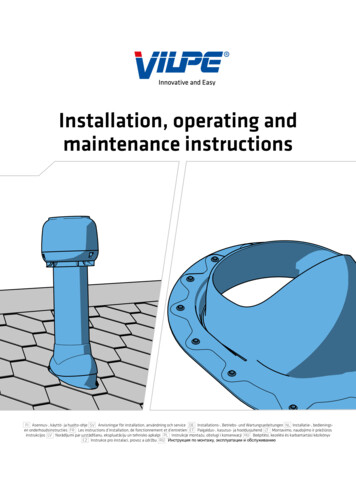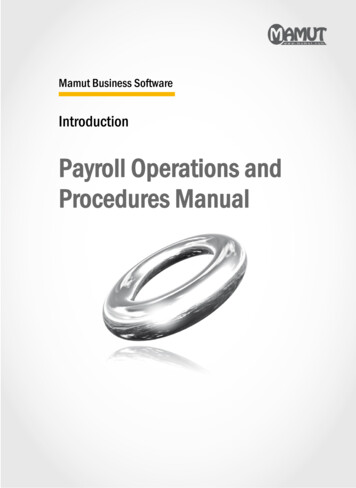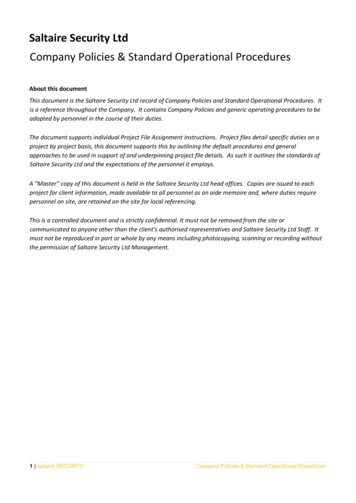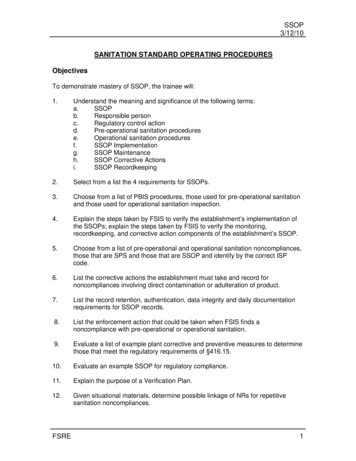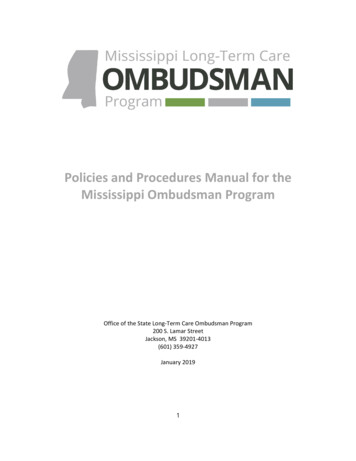
Transcription
Policies and Procedures Manual for theMississippi Ombudsman ProgramOffice of the State Long‐Term Care Ombudsman Program200 S. Lamar StreetJackson, MS 39201‐4013(601) 359‐4927January 20191
TABLE OF CONTENTSPAGENUMBERPART I: INTRODUCTION TO THE LONG‐TERM OMBUDSMAN PROGRAM SECTION A: General SECTION B: DefinitionsPART II: ADMINISTRATION OF THE LONG‐TERM OMBUDSMAN PROGRAM SECTION A: Program StructureRole and Responsibilities of MDHS, Division of AgingRole and Responsibilities of Area Agencies on Aging (AAAs)Role of State OmbudsmanRole of District or Local Ombudsman SECTION B: Designation and Withdrawal of Designation ofOmbudsman Programs and OmbudsmenDesignation of Ombudsman ProgramsWithdrawal of Designation Ombudsman ProgramsDesignation of Long‐Term Care OmbudsmenRefusal to Designate, Suspension of Designation, or Withdrawal ofDesignation of an Individual as a Long‐Term Care Ombudsman SECTION C: ConfidentialityConsentDisclosure for Complaint Investigating PurposesDisclosure of Ombudsman Program RecordsAccess to FacilitiesAccess to Resident RecordsMail, Email and PhotographsSafeguarding Notes and Documentation SECTION D: Conflicts of InterestIdentifying a ConflictOrganizational ConflictsIndividual ConflictsRemoving or Remedying a ConflictFailure to Identify a ConflictPossible Remedies SECTION E: Legal Counsel and Legal Assistance Developer SECTION F: Interference and Retaliation SECTION G: Liability SECTION H: Grievance ProcessGrievance about Refusal, Suspension, or Removal of Designationofa Local Ombudsman Entity (LOE) or a Representative of the 2829292930313233333434
Grievance about Actions of a Local OmbudsmanGrievance about a Volunteer OmbudsmanGrievance about Complaint InvestigationsGrievance about the Actions of the State OmbudsmanSECTION I: Leave of Absence3435353536PAGENUMBERPART III: TRAINING FOR OMBUDSMAN SECTION A: Designation Training SECTION B: Continuing Education TrainingPART IV: PROGRAM COMPONENTS FOR OMBUDSMAN PRACTICE SECTION A: Facility Visits SECTION B: Complaint ProcessingIntake of ComplaintsInvestigationVerification of ComplaintsResolution/Disposition of ComplaintsFollow‐UpComplaint Referral Agencies APS Referral AG (Medicaid Fraud Control Unit) Referral Health Department Referral Legal Services Referral SECTION C: Documentation and Monthly ReportingDocumentation in WellSkyMonthly Reports SECTION D: Training to Local Ombudsman and Volunteers SECTION E: In‐Service Education for Facility Staff SECTION F: Consultations for Facility Staff SECTION G: Information & Assistance/Consultations to Individuals SECTION H: Community Education SECTION I: Facility Surveys SECTION J: Resident Councils SECTION K: Family Councils SECTION L: Media and Monitoring Law & RegulationsMediaMonitoring Law & Regulations SECTION M: Facility Closures and BankruptcyFacility 05051525353545454555555
BankruptcySECTION N: VolunteersSECTION O: Pre‐Survey InformationSECTION P: Advisory CouncilSECTION Q: Fiscal Management5657575757PART I: Introduction to the Long‐Term Ombudsman ProgramSECTION A: GeneralPurpose of the ProgramThe Mississippi Department of Human Services (also called the Council on Aging) has establishedthe independent organizational unit called the Office of State Long‐Term Care FacilitiesOmbudsman (OSLTCO) within the Division of Aging and Adult Services (DAAS) which shallprovide program management and implementation of the State Ombudsman Program. TheMississippi Long‐Term Care Ombudsman Program (LTCOP) provides services to protect thehealth, safety, welfare and rights of residents in long‐term care facilities. The LTCOP investigatescomplaints and seeks resolutions that uphold the dignity and safety of the individual resident.Ombudsmen advocate for and on behalf of long‐term care residents to improve their quality ofcare and quality of life.Ten (10) local ombudsman programs are located throughout the state in the ten (10) Planningand Development Districts. In most areas, the administration of these local programs is throughthe Area Agencies on Aging (AAA), to provide, either directly or through a subcontract,ombudsman services at the local level. Within each local ombudsman program, the designatedombudsmen are responsible for Program Components. There must be a minimum of one full‐time district ombudsman for each Area Agency on Aging. However, there must be sufficientombudsmen staff to achieve Program Components throughout the planning and service areaand sufficient travel funds to provide residents with regular and timely access to theOmbudsman Program. In addition, the residents and complainants must receive timelyresponses to requests for information and complaints.EligibilityAny Mississippian, regardless of age, who resides in or who is a potential resident of a long‐termcare facility which is subject to regulation or licensure by the Mississippi State Department of4
Health (therefore, it may include an illegal unlicensed facility), shall be eligible for ombudsmanservice. The Mississippi State Department of Health regulates Nursing Homes, Personal CareHomes‐Assisted Living and Personal Care Homes‐Residential Living.Philosophy of the ProgramThe LTCOP is a resident‐centered advocacy program. Therefore, the wishes of the resident arethe primary concern regardless who is the complainant. The ombudsman will make everyreasonable effort to assist, represent and intervene on behalf of the resident.Legal Authority of the ProgramThe Mississippi Office of the State Long‐Term Care Ombudsman Program is authorized by bothstate (Long‐Term Care Facilities Ombudsman Act in §43‐7‐51 through §43‐7‐79 of the MississippiCode) and federal law (Older Americans Act, Public Law 89‐73, Older Americans Act of 1965, asamended through Public Law 114‐144, enacted April 19, 2016, 42 U.S. Code Chapter 35). TheLong‐Term Care Ombudsman Program Final Rule is codified in 45 CFR 1324. It is a federalregulation on how to carry out the OAA. The Nursing Home Reform Law of 1987 (OBRA ’87) andrevised regulations in 42 CRF 483 are also very important as they provide two key provisions:Quality of Care:Each resident must receive and the facility must provide, the necessarycare and services to attain or maintain the highest level of physical,mental and social well‐being as listed in the resident’s care plan.Quality of Life:Facilities must care for residents in a manner and in an environment thatmaintains or enhances each resident’s quality of life.Unit of ServiceA unit of service equals one client hour and includes all activities carried out by the Ombudsmanwhich relate to client service, training, and program management activities. Examples includethe time spent on complaints/concerns made by or on behalf of a current or potential long‐termcare resident, the planning and implementation of public workshops on long‐term care issues,5
attending training workshops for ombudsman and the completion of ombudsman reports. Thisdoes not include time spent completing time sheets or travel vouchers.ApplicabilityThese policies and procedures govern the actions of the Mississippi Office of the State Long‐Term Care Facilities Ombudsman, designated district, local and volunteer ombudsman, provideragencies, Area Agencies on Aging (AAA), Mississippi Department of Human Services Division ofAging and Adult Services (DAAS) and other parties involved in the operation of the MississippiLong‐Term Care Ombudsman Program.PART I: Introduction to the Long‐Term Ombudsman ProgramSECTION B: DefinitionsAbuse: Negligent or willful infliction of injury, unreasonable confinement, intimidation, or cruelpunishment with resulting physical harm, pain, or mental anguish; or deprivation by a person,including a caregiver, of goods or services that are necessary to avoid physical harm, mentalanguish, or mental illness or sexual abuse.ADL: Activities of Daily Living, including but not limited to, bathing, walking, excretory functions,feeding, personal grooming, and dressing. These have been revised to: mobility/ambulation;community mobility; transferring; eating and meal preparation.Advanced Health‐Care Directive (AHCD): Designating an agent to make health‐care decisions.MS has the Uniform Health‐Care Decisions Act in §41‐41‐201 through §41‐41‐229 of the MSCode which combines the power of attorney for health care along with a living will. An exampleis provided in §41‐41‐209.Advisory Council: This group provides guidance and advice to the SLTCO in order to enhance theeffectiveness of the statewide LTCOP. Each AAA has an Advisory Council.Area Agency on Aging (AAA): An agency designated by the DAAS to arrange for providing theaging services in its planning and service area (PSA). There are 10 AAAs in Mississippi thatcontract with DAAS to provide services under Title III and Title VII of the OAA.6
Area Plan: A plan developed by AAA for its relevant planning and service area as required by theOlder Americans Act (OAA) §306.Assisted Living Facility (ALF): Facility that provides personal care and the addition ofsupplemental services to include, but not be limited to, the provision of medical services (i.e.,medication procedures and medication administration) and emergency response services.These are for individuals who want to maintain some level of independence, but require supportwith activities of daily living (ADLs).Case: Each inquiry brought to, or initiated by, the ombudsman on behalf of a resident or groupof residents involving one or more complaints relating to the health, safety, welfare, or rights ofresidents which requires opening a case and includes ombudsman investigation, strategy toresolve, and follow‐up. One or more complaints constitutes a case. You cannot have a casewithout a complaint.Certification: The designation provided by the State Long‐Term Care Facilities Ombudsman to anindividual who meets minimum qualifications, is free of conflicts of interest, and has successfullycompleted training and other criteria stipulated in the Certification Requirements for theMississippi Ombudsman Program.Designation authorizes such individual to act as arepresentative of the Long‐Term Care Ombudsman Program. An ombudsman (even a volunteer)shall not be authorized to investigate a complaint without being certified by the State Long‐TermCare Facilities Ombudsman.Closed Case: A case is where none of the complaints within the case require any further actionon the part of the ombudsman and every complaint has been assigned the appropriatedisposition code.Community Education: Presentations to community groups, other agencies or professionals orto groups of residents or families (other than resident & family councils) on long‐term careissues. Each Ombudsman district is required to do two community education events eachfederal fiscal year.Complaint: A concern brought to, or initiated by, the ombudsman for investigation and actionby or on behalf of one or more residents of a long‐term care facility relating to the health,safety, welfare or rights of a resident. One or more complaints constitutes a case. You cannothave a case without a complaint.Complainant: An individual who lodges a complaint. This could be a resident, family member,facility staff, ombudsman, banker, police officer, social worker, etc.Conservator: An individual appointed by the Court to make financial decisions for and exercisethe legal rights and powers of an adult where the adult lacks sufficient capacity to make orcommunicate significant responsible decisions concerning the management of his or her7
property. A conservator has priority over the power of attorney agent. See §93‐13‐251 through§93‐13‐267 of the MS Code.Consultation: Means providing information and technical assistance to facilities and individualsregarding long‐term care issues. It is often by telephone. It does not involve investigating andworking to resolve a complaint (a consultation is not a case, therefore, isn’t a complaint). If yourefer someone to another agency and are not actively involved in investigating and working toresolve the problem, it is not a case or complaint. However, it is counted as a consultation.Designation: Status which authorizes an individual (whether a district or local ombudsman orvolunteer) to act as a Representative of the Office. Said individual has successfully completedthe training requirements and is also free of conflicts of interest.District Ombudsman: An ombudsman who acts in a supervisory position over local ombudsmanin their respective AAA region. There are currently 10 district ombudsmen in the MississippiLong‐Term Care Facilities Ombudsman Program.Exploitation: The illegal or improper act or process of an individual, including a caregiver, usingthe resources (money, assets, property) of an older or vulnerable individual for monetary orpersonal benefit, profit or gain without the informed consent of the resident.Family Council: Family members of residents and/or facility staff that meet regularly where theombudsman can provide technical assistance, information, training and support.Guardian: An individual or entity appointed by the Court to make personal and/or propertydecisions for and exercise the legal rights and powers of an adult where the court finds the adultlacking sufficient capacity to make or communicate significant responsible decisions concerninghis or her health or safety. Even residents who have been adjudicated incapacitated and towhom a guardian has been appointed retain some rights. These residents need to have theirdesires and preferences considered even if the guardian has the legal responsibility over thatdecision.Immediate Family: A member of the household or adult relative with whom there is a closepersonal or significant relationship. Examples include father, mother, son, daughter, brother,sister, aunt, uncle, firstcousin, nephew, niece, wife, husband, father‐in‐law, mother‐in‐law, son‐in‐law, daughter‐in‐law,brother‐in‐law, sister‐in‐law, stepparent, stepbrother, stepsister, stepchild, half‐sister, half‐brother, grandparent or grandchild. This definition is limited to conflict of interest only.Information & Assistance: Services which provide information to individuals on long‐term careor the needs/rights of long‐term care residents.8
In‐Service Education to a Facility: Presentations to long‐term facility staff on long‐term careissues. Each Ombudsman district is required to do five (5) In‐Service Education seminars perfederal fiscal year.Legal Representative: An agent under a valid power of attorney, provided that the agent isacting within the scope of his or her agency; an agent under a durable power of attorney forhealth care or health care agent under an advance health care directive; or an executor oradministrator of the estate of a deceased resident. Residents who have a legal representativewith decision‐making power retain their ability to participate in their own care and to exercisetheir rights.Local Long‐Term Care Ombudsman: An individual designated by the SLTCO to be an advocate forresidents in long‐term care facilities to protect their health, safety, welfare and rights.Long‐Term Care: Refers to extended medical and social services required by people with chronicconditions to help them live as independently as possible despite significant challenges. It maybe delivered in community settings (adult day care), institutionalized settings (nursing homes) orinformal settings (home of friends or family).Long‐Term Care Facility: Any skilled nursing facility, extended care home, intermediate carefacility, personal care home or boarding home which is subject to regulation or licensure by theState Department of Health (Mississippi Code §43‐7‐55).Neglect: It is the failure to care for a person in a manner which would avoid physical oremotional harm or pain, or the failure to react to a situation which may be harmful. It may ormay not be intentional.Not Verified: It is determined after work (interviews, record inspection, observations, etc.) thatthe circumstances described in the complaint are not accurate.Office of State Long‐Term Care Facilities Ombudsman: Organizational unit in MS which is led bythe State Long‐Term Care Ombudsman. The organizational unit consists of the SLTCO only.PNA (Personal Needs Allowance): After an applicant is determined eligible for Medicaid in anursing facility, the individual is required to pay toward the cost of their care if income allows.This is referred to as Medicaid Income. It is total income less allowable deductions. PNA is onesuch deduction. It iscurrently 44 per month. Veterans and surviving spouses who receive a 90 VA pension get a 90 PNA. Medicaid Income is not paid by a HCBS participant.Representatives of the Office: District, local or volunteer ombudsmen selected by an areaagency on aging who have been designated by the State Ombudsman to act as residentadvocates on behalf of the state.9
Resident: Any resident, prospective resident, prior resident or deceased resident of any long‐term care facility, regardless of age.Resident Council: Residents of long‐term care facilities and/or facility staff that meet regularlyto discuss issues relating to their care and quality of life. Assisted living facilities are not requiredby federal law to facilitate meetings, unlike nursing homes.Resident Representative: means either:(1) an individual chosen by the resident to act on his or her behalf concerning decisions,accessing medical or other personal information, managing financial affairs and receivingnotifications;(2) a person authorized by State or Federal law (including agents under a power of attorney) toact on the resident’s behalf concerning decisions, accessing medical or other personalinformation, managing financial affairs and receiving notifications;(3) Legal representative; or(4) Court‐appointed guardian or conservator of the resident.Resolved: This is how the complaint has been resolved depending on the resident’s satisfaction.It can either be partially resolved, not resolved or resolved to the satisfaction of the resident.Skilled Nursing Facility (SNF): Facility in which medical care must be provided 24‐hours bytrained individuals, such as a registered nurse and physical, speech and occupational therapists.Examples of skilled nursing services include wound care, intravenous (IV) therapy, injections,physical therapy, and monitoring of vital signs & medical equipment.State Long‐Term Care Ombudsman (SLTCO): An individual who is the head of the OmbudsmanProgram for the State of Mississippi on a full‐time basis to fulfill the duties and responsibilities ofOlder Americans Act. Said individual is responsible for ensuring that all residents of long‐termcare facilities in Mississippi have adequate access to the services of the LTCOP and that eachAAA has at least one designated ombudsman.Systems Advocacy: Activities which support and promote issues which benefit a group of long‐term care residents.Volunteer Ombudsman: An individual over 18 years old who has completed a CertificationTraining prescribed by the State Ombudsman Program and is designated to act as arepresentative to participate in the ombudsman program.10
Willful Interference: means the actions or inactions taken by an individual in an attempt tointentionally prevent or interfere with the State Ombudsman Program from performing any oftheir functions or duties.WellSky: The statewide reporting system used to collect data relating to complaints,consultations, training provided, and other activities of the ombudsman program. This data isused when submitting the NORS annual report to the AOA. It is due by January 31st of each yearand represents information from the previous federal fiscal year (Oct. 1st‐Sept. 30th).PART II: Administration of the Long‐Term Ombudsman ProgramSECTION A: Program Structure Role and Responsibilities of Mississippi Department of Human Services, Division ofAgingPursuant to the federal Older Americans Act and state law, the Mississippi Department ofHuman Services Division of Aging and Adult Services (DAAS) has established the Office of theState Long‐Term Care Ombudsman (OSLTCO). The Office of the State Long‐Term CareOmbudsman is independent in its representation of the interests of long‐term care facilityresidents, without representing the positions or policies of the Division of Aging and AdultServices, the Mississippi Department of Human Services, or any other governmental entity. TheMississippi Department of Human Services, Aging and Adult Services, will: Provide for a full‐time State Long‐Term Care Ombudsman (SLTCO);Provide supervision of the SLTCO without interfering with its work to promote theinterests of long‐term care facility residents;Not have personnel policies or practices which prohibit the Office of the StateOmbudsman from performing the functions and responsibilities under the OmbudsmanFinal Rule as set forth in 45 CFR §1324.13 or from adhering to the access, confidentialityand disclosure requirements of section 712 of the OAA;Provide the SLTCO with administrative support for personnel, fiscal, contractual, data,and budgetary management, including administration of contracts for the LTCOP andbetween the DAAS and area agencies on aging (AAAs) and/or designated provideragencies;Provide funding for a statewide Long‐Term Care Ombudsman Program (LTCOP) inaccordance with the OAA and through application of a statewide allocation formulaapproved by the SLTCO, within appropriations specifically designed for the SLTCO;Provide the SLTCO with authority to manage funds designated for the LTCOP;Provide opportunities for training Office of the State Long‐Term Care FacilitiesOmbudsman and the Representatives of the Office of the State Long‐Term Care Facilities11
Ombudsman and may use funds appropriated under Title III and/or Title VII of the OlderAmericans Act;Monitoring the SLTCOP by ensuring that the State Ombudsman Program complies withthe OAA and the Final Rule;Ensure that the Ombudsman Program has sufficient access to residents, facilities andinformation to do their duties;Combine the goals and objectives of the OSLTCO into the state and area plans on aging;Provide elder rights leadership by coordinating Ombudsman program services withother programs authorized by Title VII of the OAA;Provide adequate legal counsel to the Ombudsman Program that is free of conflicts ofinterest;Ensure that any review of files, records or other information maintained by theOmbudsman Program is consistent with the disclosure limitations as set forth in 45 CFR§1324.11(e)(3) and 1324.13(e).Require the OSLTCO to prepare an annual report for the AoA/ACL;Refrain from interference with the LTCOP’s mandate to advocate for and represent theinterests of long‐term care facility residents; andRequire the OSLTCO to fulfill its duty of systems advocacy as the State Ombudsmandeems is appropriate, regardless of State lobbying laws.Role and Responsibilities of Area Agencies on Aging (AAAs)The Area Agencies on Aging or other provider agencies must assure: They are responsible for personnel management, but not the programmatic oversight,of the Representatives of the Office;They maintain separate budget and expenditure accounting for the OmbudsmanProgram and it is made available to the State Ombudsman upon request;That funds obtained from all sources related to the LTCOP are available and used for theprogram;They will follow strict confidentiality requirements in handling and storing allinformation and records (paper and electronic), telephone communication and internalcommunication within the organization so as to avoid any conflicts of interest;That no resident‐identifying information shall be disclosed to individuals outside of theOmbudsman Program;That there is a Memorandum of Understanding (MOU) between the local LTCOP and theTitle IIIB Legal Services or an alternative written arrangement for providing advice andcounsel to LTCOP and residents of LTC facilities;That neither the Ombudsman nor the AAA staff is subject to a conflict of interest, inparticular that the organization itself, its board members, advisory council members,employees and volunteers do not derive personal or economic gain from LTC facilities or12
their associations. An annual Conflict of Interest screening tool must be completed andsent to the State Ombudsman on or before October 31s;Coordination with the State Ombudsman in the employment process or appointment ofRepresentatives of the Office of the Long‐Term Care Facilities Ombudsman by ensuringthat applicants do not have an individual conflict of interest as determined by the StateOmbudsman;All Ombudsman Programs must follow the Mississippi Ombudsman Program’s Policiesand Procedure Manual, in particular the Program Components for Ombudsman Practice;That the local ombudsman program abides by the complaint priority guidelinesestablished by the Office of the State Long‐Term Care Ombudsman as set forth in theMississippi Ombudsman Program’s Policies and Procedure Manual;That a minimum of one on‐site visit is conducted per month to each long‐term carefacility located in the AAA’s Service Area. Complaint related visits should be in additionto routine visits. If a facility is not legally licensed, but should be in accordance to §43‐11‐1 et seq of the MS Code, that facility remains within the jurisdiction of theOmbudsman Program. There must be sufficient ombudsman staff to achieve ProgramComponents and sufficient travel funds to cover these visits;Assure LTCO staff attendance at annual designation training and all other statewideLTCO training programs in addition to any required meetings with the StateOmbudsman;Each local LTCOP shall create and maintain a current plan for recruitment, training andsupervision of volunteer ombudsman; andThere are no personnel policies or practices which prohibit the Ombudsman Programfrom performing the duties and functions under the Ombudsman Final Rule as set forthin 45 CFR §1324.19 or from adhering to the requirements of section 712 of the OAA.Role of State OmbudsmanThe State Ombudsman shall serve on a full‐time basis to personally or through Representativesof the Office perform the functions and duties according to state and federal law. The StateOmbudsman Program shall provide services to protect the health, safety, welfare and rights ofresidents in long‐term care facilities. The State Ombudsman shall have training or experience inthe field of long‐term care and advocacy, negotiation and problem resolution skills, leadershipand program management skills, and consumer‐oriented public policy advocacy. The Office ofthe State Ombudsman shall be under the direct supervision of the Director of the Division ofAging and Adult Services. The State Ombudsman shall provide leadership and monitoring,including fiscal management and performance monitoring, of the Mississippi Long‐Term CareOmbudsman Program. The SLTCO shall assure that all residents of long‐term facilities in theState have access to the services of the Mississippi Ombudsman Program (LTCOP) and that thereis a designated ombudsman in each service area in the state. The SLTCO is responsible forproviding leadership for the statewide Long‐Term Care Ombudsman Program. Duties of State13
Long‐Term Care Facilities Ombudsman shall include: Being responsible for oversight of the development and updating the requirements forthe Ombudsman program by providing programmatic management of the Office whichincludes developing policies, procedures, and standards for the administration of theLTCOP and LTCO practice; The State Ombudsman shall coordinate, where applicable, through area agency on agingplans to approve the contracts or plans of the Representatives of the Office of the StateLong‐Term Care Facilities Ombudsman and to regularly monitor their programperformance. State Ombudsman shall provide oversight of the quality and programoperation of the Representatives of the Office of the State Long‐Term Care FacilitiesOmbudsman. However, wherever the Representatives of the Office of the State Long‐Term Care Facilities Ombudsman is organizationally located, that agency shall beresponsible for personnel management; Monitoring the Representatives of the Office which includes the following: reviewingmonthly reports and data entry, one on‐site visit per year to each district and fiscalmanagement; Personally, or through Representatives of the Office, identify, investigate and resolvecomplaints made by or on behalf of residents in long‐term care facilities that affect thehealth, safety, welfare and rights of residents in long‐term care facilities;Ensuring that residents have regular and timely access to the services provided throughthe Office and such residents and other complainants received timely responses to theircomplaints from the Representatives of the Office;Ensuring that the LTCOP is representing the interests of residents before governmentalagencies;Informing residents how to obtain services through the Ombudsman Program;Being responsible for monitoring the files, records and other information of theOmbudsman Program;Prohibiting inappropriate disclosure of the identity of any complainant or resident withrespect to LTCO files, records, or other information;Implementing a proper record maintenance system wherein all the files, records andother information of the State Ombudsman Program, whether in physical, electronic orother format, shall be the property of the Office of the State Long‐Term Care FacilitiesOmbudsman. Such records are the property of the SLTCO and may not be released,disclosed, duplicated or removed without the written permission of the SLTCO ordesignee;Providing technical assistance to Representatives of the Office and information andassistance regarding long‐term care issues to the general public, residents and
service. The Mississippi State Department of Health regulates Nursing Homes, Personal Care Homes‐Assisted Living and Personal Care Homes‐Residential Living. Philosophy of the Pro






